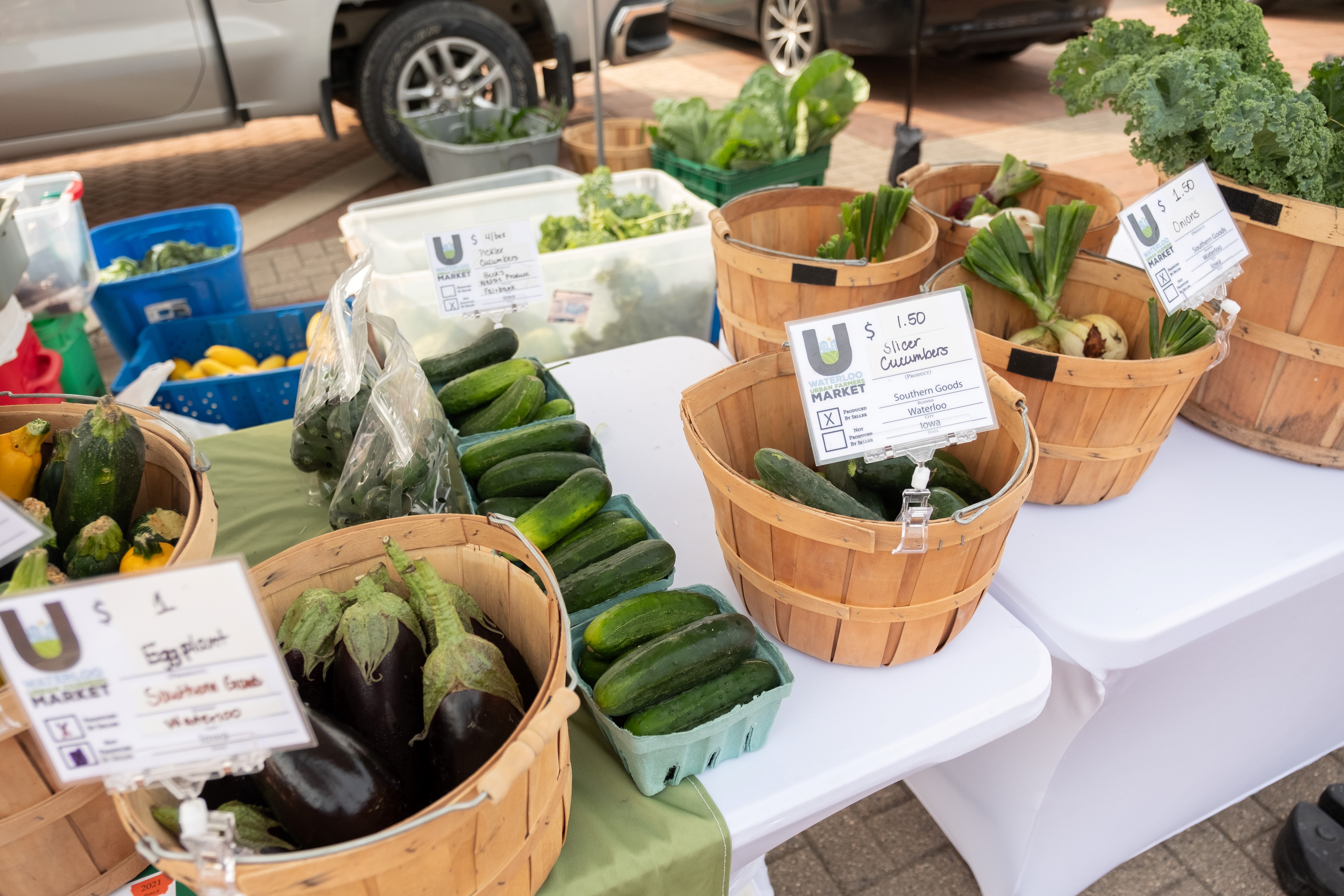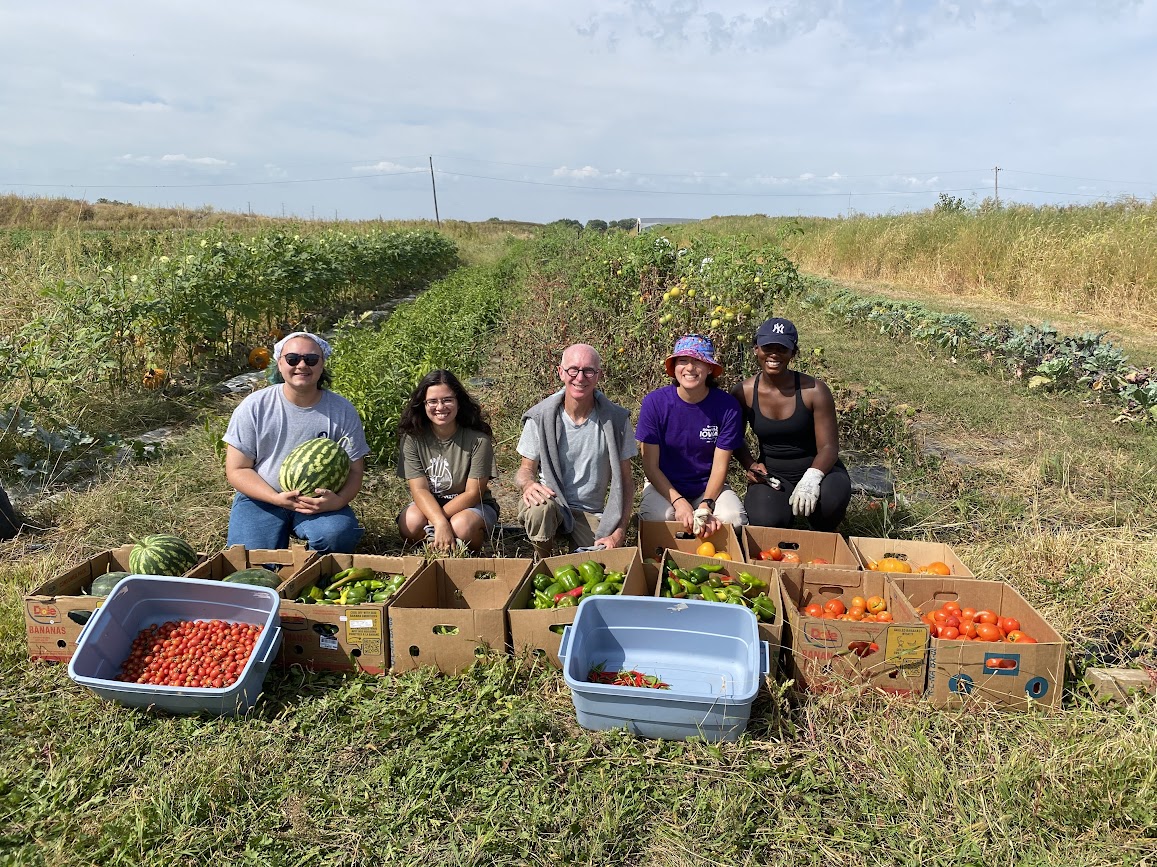Local Food Program
Strengthening Iowa's local food economy
The Local Food Program at the CEEE works to develop a local and regional food system that positively impacts consumers, farmers, and communities through education, collaboration, and economic development.
Our team works hand-in-hand with our valued partners to develop a diverse array of tools, education, experiences, and programs with the overarching goal of making food production and local food consumption accessible to everyone. We understand the importance of fostering self-sufficiency and supporting local economies. We create experiences that connect communities with the joy of growing and harvesting their own produce. In collaboration with our partners, we strive to create a food system that encourages not only self-sustainability but also a collective effort to purchase locally sourced food, fostering a healthier and more sustainable future for all.
Local Food Resources
Farmers
We support local farms by connecting them with markets and strengthening the farming community. Beyond matchmaking, we build farmer networks and offer educational programs to help direct-marketing farms succeed. Our efforts foster resilience and sustainability in regional agriculture.
- Read more
- Farm to Institution - We can help connect you to wholesale buyers including schools, grocers, restaurants, and caterers. Join us in January and July for our annual local food producer/local food buyer networking events.
- 2026 Local Food Guide - Each January you have the opportunity to join our printed Cedar Valley Local Food Guide. We want the Cedar Valley to know where to purchase their local products. Check out the membership benefits and membership criteria.
- CVRFFN Coalition - Get involved in our coalition where individuals and organizations passionate about food come together to learn and share ideas and projects.
Contact Jodie Huegerich at jodie.huegerich@uni.edu for more information.
Farmers Markets
Farmers markets are lively community spaces where local farmers, artisans, and vendors sell fresh, seasonal produce, handmade goods, and other locally sourced products. They offer a direct connection between growers and consumers, promoting sustainable agriculture and supporting small businesses.
- Read More
Resources for Consumers:
- Farmers Market: Guide to Successful Shopping
- What’s In Season in the Cedar Valley
- What’s In Season in the Cedar Valley (versión en español)
- Food Assistance Programs and Farmers Markets
Resources for Vendors
- Farmers Market Resources for Vendors
- A Vendor’s Guide to Nutrition Assistance
- Get involved in our CVRFFN Coalition
- Farmers Market Vendor Workshop
- Read more about this workshop in the Education & Events tab below
- Iowa Farmers Market Toolkit Handouts
- Cottage Foods and Farmers Market
Education & Events
Our team works to develop a local and regional food system that positively impacts consumers, farmers, and communities by providing local producer workshops and hosting community events.
- Read More
- We meet approximately four times/year. Individuals, organizations, and businesses are welcome to attend.
Producer/Buyer Networking Event
- This annual event gives buyers and producers the opportunity to meet in person to make connections and learn about products available. Every buyer talks to every producer during the event.
Farmers Market Workshop
- This is an opportunity for experienced vendors and new vendors to network with each other and gain knowledge about farmers markets in the Cedar Valley region.
Farm to Fork Dinner
- This event brings together members of our community to share a table, a story, and a local food meal, while supporting our local food system.
UNI Local Food Festival
- The UNI Local Food Festival celebrates local food, art, and sustainability. It connects students, faculty, and staff to local food and farm businesses, community organizations, and student organizations focusing on local food, art, sustainability, and community.
Local Food Leader 101 Certification
- This is is an individual, skill-building certification for beginning food systems practitioners or those looking to be engaged in their local food system. The certification teaches foundational competencies critical for successful food systems development, including common language, dignity and involvement in food systems, facilitation and leadership, evaluation, and professional development.
Additional Resources
Our team works hand-in-hand with our valued partners to develop a diverse array of tools, education, experiences, and programs with the overarching goal of making food production and local food consumption accessible to everyone.
- Read More
- Black Hawk County Iowa State University Extension and Outreach
- Black Hawk County Community Food Assessment
- Diamond Event Center in Jorgensen Plaza
- Healthy Harvest of North Iowa (recipes)
- Iowa Food System Coalition
- Northeast Iowa Food Bank
- Rooted Carrot Co-op Market
- Value Chain Coordinator Report 2023
- Value Chain Coordinator Report 2024
- Value Chain Coordinator Partner Survey
- We Arose
CEEE Events
Austin Frerick presents: “Game Over: Ending Corporate Agriculture’s Game of Monopoly”
Wed, Oct 14 2026
6:00pm - 8:00pm
UNI Center for Energy and Environmental Education, 8106 Jennings Dr, Cedar Falls IA 50614



